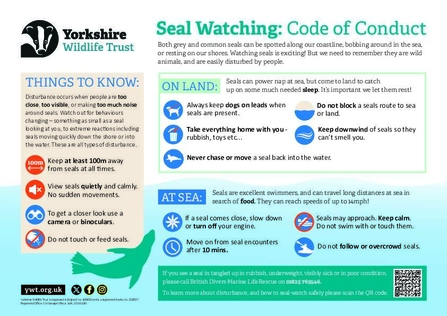The UK's most charismatic marine mammal
The UK grey seal population represents around 40% of the world’s population, making this an important home for them. Here in Yorkshire, we're lucky enough to be able to spot both grey seals and common seals up and down our coastline, bobbing around in the sea, resting on our beaches and breeding.
The first few months of a pup's life are tough. They must quickly learn to hunt for themselves and negotiate challenging sea conditions. Both pups and adult seals need to ‘haul out’ on our coast to rest, recover and breed, and it’s during these moments they are particularly vulnerable to disturbance from us.
How can seals be disturbed?
Seals can be disturbed if people get too close, are noisy around them or startle them. Their safest place is the sea, so if they feel under threat, they'll immediately move to be beneath the waves. If they're on sharp, rocky ground, this can lead to injuries, and the surge of the stress hormone cortisol is bad for their long-term health (the same as for humans!).
These disturbances all use up energy reserves the seals are holding on to for other vital activities such as swimming, hunting, resting, digesting food, and hauling themselves out of the water.
Seals and seal pups can also be attacked by dogs, with often tragic consequences.
Many young seals sadly don’t reach their second birthday, so lessening our impacts on them is key to their future survival. Fortunately these disturbances are easily preventable.
How can I help, and what should I do if I see a seal?
Firstly, if you're walking along the coast or taking part in watersports, keep a close eye out for seals. Knowing they could be there means you stand a good chance of spotting the seals before they spot you.
If you spot a seal, do not approach them and keep a big distance between you and them. Be quiet (turn down/off any engines) and don't make any sudden loud noises. A good rule of thumb is that if a seal is looking at you then it’s disturbed, so move further away from it.
If your dog is off the lead (where this is permitted), recall them and put them on the lead until you are a safe distance away. Sometimes paths will be redirected or access to our coastline temporarily restricted to protect our seals - follow all signage if so.
Remember that’s it’s normal for seals to haul out to rest so a seal on the beach doesn’t necessarily need any help.
Unless the seal is clearly injured or in distress, just give them lots of space. If you think the seal needs help, please contact British Divers Marine Life Rescue (BDMLR) on 01825 765546. Seals can give a nasty bite when trying to defend themselves, so never get too close or attempt to move a seal yourself.

